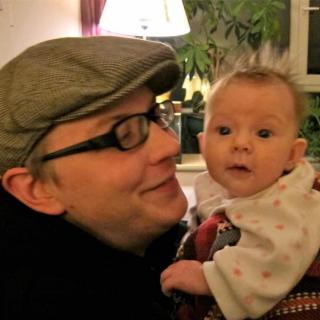
介绍:
My 6-year-old thinks I’m a baby — at least when I speak Mandarin.
我六岁的孩子觉得我像一个小孩,至少是当我说普通话的时候。
“I like it when you speak Chinese,” she recently told me.
最近,她对我说:“我喜欢你说中文”。
“It’s a little awkward. It’s like a baby. And I like babies.”
“你的中文有点笨拙,像一个婴儿。我喜欢婴儿。”
Chinese isthe blonde, blue-eyed girl’s first language. Lily, who was born in Beijing, started to speak English later, after mixing the two tongues.
中文是这个金发碧眼小女孩的母语。莉莉生在北京,以前总是会把两种语言混在一起说,这之后才开始说英语。
(Her mother isn’t Chinese.)
(她的妈妈不是中国人)
“Baba (Daddy) eatsjirou(chicken). Baba look at xiongmaode (the panda’s)
“爸爸eats鸡肉。爸爸look at大熊猫的hand。”
By age 3, she’d separated the languages.
直到3岁,她才能区分两种语言。
Her 2-year-old brother recently acquired his first several words — nearly all Chinese.
而莉莉两岁的弟弟最近也学会说话了——说的几乎都是中文。
He nai (drink milk), baobao wo (hug/hold me), jiejie ku (sister is crying).
He uses both “ball” and its Chinese equivalent, “qiu”.
“喝奶,抱抱我,姐姐哭。”
He uses both “ball” and its Chinese equivalent, “qiu”.
他会说英语里的“ball”和中文里的“球”。
“No” is one of his few—and favorite —English words. It’s worth noting, Chinese doesn’t have a direct equivalent to “yes” and “no” but uses other grammatical constructions to affirm and negate.
“No”是他会的为数不多的几个英文单词,也是最喜欢的一个。但是这个词并没有什么用,因为中文里没有和“yes”和“no”对应的词汇,而是用其他语法结构来表达肯定和否定。
My Chinese is perhaps less like a toddler’s and more like an immigrant’s (a concept my daughter hasn’t developed. She must soon to explain her parents.)
也许,我的中文说的并不像小孩,而更像是外来的移民。(移民这个概念我的女儿还不清楚,不过她肯定很快就能替父母辩解了)
I’m certified as intermediate in reading and writing, since I passed the national Chinese Proficiency Test’s Level 4 before Lily was born. (Level 6 is the highest.)
在莉莉出生之前,我就通过了全国汉语水平四级考试,达到了中级读写水平。(六级为最高等级)
And my spoken Chinese is multiplications better than my character proficiency.
我的中文口语能力比书面表达能力好太多。
I can converse about, say, (basic) economics but with grammatical flubs, tone errors and a funny accent. The second two are common among native Chinese with less-than-perfect Putonghua (standardized Mandarin).
我可以谈论(基本的)经济学,但是语法错误,语调奇怪,口音滑稽。而后面两个问题在普通话不标准的中国人中也很常见。
There’s a theory that language shapes how we perceive the world.
有一种理论认为,语言决定了我们看待世界的方式。
I’ve observed, for instance, that after using only Chinese for a period, two things happen.
比如说,我留心到在使用中文一段时间后发生的两件事。
First, I start to think simple thoughts in Chinese. I notice because I sometimes talk to myself. Say I’m traveling and haven’t spoken English in days — I’ll mutter “Wode shouji zai nali?” rather than “Where’s my phone?”.
第一是我开始用中文来表达一些简单的想法。因为我有时会自言自语,所以注意到了这点。比如我在旅行,而且几天没说英语了,我会嘟囔着“我的手机在哪里?”而不是“Where is my phone”。
Second, I think about the world differently in such ways as, in my mind’s eye, “opening” rather than turning on the light — a direct translation into English that retains the Chinese language’s conceptualization of the phenomenon.
第二,以这种方式,我的内心中所感知的世界是不同的。用“opening(打开)”而不是turning on(开灯)——直译成英文,但保留了中文中的语言概念。
I was wondering how this works for Lily, since she’s a native speaker of both but acquired Chinese first.
我想知道这种方式在莉莉身上如何体现,因为中英文都是她的母语,只是她先学会了中文。
She says she only thinks in English and translates in her head.
她说她只用英文思考,然后在脑子里翻译出来。
She claims to never dream in Chinese, which I sometimes do.
她从来没有用中文思考,而我有时候会这样。
That seems counterintuitive.
这似乎违背常理。
She told me in English the other morning: “I’m not afraid of the cold. I’m afraid of being hot.”
某天早上,她用英语告诉我:“I'm not afarid of the cold. I'm afraid of being hot. (我不怕冷,我怕热)。”
This is a direct translation into English. Chinese typically conveys an aversion to temperature extremes using the word for fear (pa), rather than a synonym for dislike.
这句话是直译成英文的。中文中通常用“怕”这个词传达对极端温度的厌恶,而不是用“不喜欢”之类的同义词。
And I’ve noticed how our family mixes the languages at home.
而且我注意到我们在家里也会混合两种语言。
I’ll ask my wife: “Mind if I kai (open) the kongtiao (air conditioner)? Did you mai (buy) the piao (tickets)?”
我会问我的妻子:“Mind if I 开空调?Did you买票?”(介意我开空调吗?你买票了吗?)
My daughter only calls me Baba— never Daddy — whichever language or mix we’re using.
不过,不论我们用哪种语言交流或是混合使用,我的女儿只叫我“爸爸”,从来不会叫“Daddy”。
That said, I’m still a baby to her.
这说明,和她相比,我的中文依然是婴儿水平。
Perhaps I am —in the way of rediscovering the world like children do, through another language. It’s like “opening” the light that illuminates a new perspective.
或许我现在就如小孩一般,通过另一种语言重新认识这个世界。就像是“开”了盏灯,照亮一个全新的视角。
上一期: The Chilean bird that rescued our holiday 拯救了我的感恩节的智利火鸡
下一期: 剧场观众映射文化差异 At the theater, watching the audience
下一期: 剧场观众映射文化差异 At the theater, watching the audience
大家还在听

